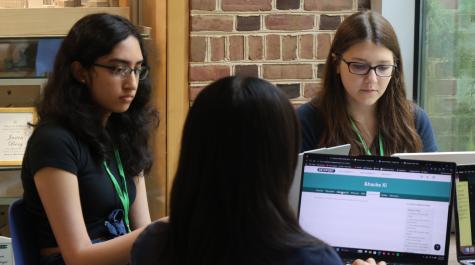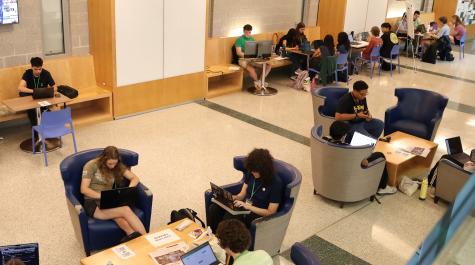&hacksXI showcases innovation and the environment
Almost 200 student innovators came together Sept. 27-28 for &hacksXI, William & Mary’s annual hackathon that celebrates competition while building community and helping students learn new skills.
This year’s &hacks featured over 30 project submissions spanning topics from environmental sustainability to finance and economics, alongside hands-on workshops and a career fair that equipped students with valuable skills and resources.
“The word hackathon can be a little bit confusing, but it's basically an event where people can make any kind of project they want using technology,” said Libby McClough, one of the student organizers for &hacks. “Our overall goal is to help people learn and meet each other and have fun.”
McClough said they changed the name of the event last year to highlight the ampersand and underscore their interdisciplinary mindset.
“Our goal is to bring together students who are interested in technology, not just computer science majors,” stated McClough. “We want interdisciplinary hackers because we think it's important for people to work with other kinds of people. That's how things work in the real world and it's important to have skills to be able to collaborate with different kinds of people.”
Wilson Lin, another student organizer for &hacks, echoed those sentiments.
“We do want to push the notion of you don't need to be a computer science major to participate in the hackathon because, especially with investments in AI and other fields, the barrier to entry is a lot less than it used to be and there's always different things that different disciplines bring to the table,” added Lin.
To help encourage more interdisciplinary projects, last year &hacks introduced the Ampersand Award.
“[The Ampersand Award] is a challenge to make a project that best combines technical and non-technical skills,” explained Lin. “We highly encourage either students who can think outside the box or students who form groups with many different disciplines within that group to try and get a well-rounded project out of the hackathon.”
The theme for this year’s &hacks was sustainability, a focus that resonated with both participants and organizers. McClough, who has long advocated for incorporating environmental awareness into the hackathon, said she was thrilled to finally see it happen.
“Especially with AI becoming more popular, thinking about the environmental impacts of that and how we can use technology to solve environmental problems, because that's also just something that I've personally very passionate about,” said McClough.
Lin said it was an easy decision to make the environment this year’s theme since 2025 is the “Year of the Environment” at William & Mary and the pressing issues currently facing our planet.
“If we can find a way to bring more attention to it, possibly bring a solution to it, why not,” stated Lin.
The winner for Best Overall Environmental Hack went to the team of Chloe Carr, Celia Schaefers, and Benjamin You for developing WaterWatch, a platform that takes scientific data from U.S. Geographical Surveys with crowd-sourced information from local communities.
The group, who had only met each other the day prior, said though they wanted their project to have real-world impact, it really was a case of happenstance based on a flash flood that happened the first day of the hackathon.
“We did decide throughout the brainstorming process that we wanted a project that had real world applications,” said You. “We thought with the theme of the environment, what better way to have real-world application and go with the motif of the hackathon then trying to create a project with real environmental impact.”
The team believed combining crowd-sourced flooding images and reports with scientific data would create a more comprehensive understanding of an area’s flooding impacts and inspire local officials to take meaningful action.
“If someone came up to [local officials] with the actual data, not just from statistical data but also from people and images that they've uploaded, it's a lot more convincing to the local government that they need to actually deal with a water situation,” stated Carr.
Schaefers added that “having the actual images or local community experiences with the place where it floods can be helpful for solving the issue and for talking with whoever is going to do that project to show them how it's actually impacting people.”
The opportunity to work on these types of projects is what Schaefer liked most about &hacks.
“I think it’s just a really good experience because here, with the hackathon, it's possible to team up with people that you might have not met before, learn new things through the workshops and then create a project that actually relates to something you want to do or interest you have.”
In addition to community, Ryan Miecznikowski, who won the Best Overall category with his partner Daniel Seo for their project Song Quiz, said &hacks also provides an opportunity to learn and develop outside the classroom.
“It's gives you a designated period to really just bunker down and focus on a subject or a topic you've never done,” said Miecznikowski. “I think [&hacks] is a really good experience for anyone who wants to learn more for computer science or anything tech related.”
See all the &hacksXI projects and award winners here.
This article was created with the help of OpenAI's ChatGPT-5. All content was reviewed and edited by the communications team.


